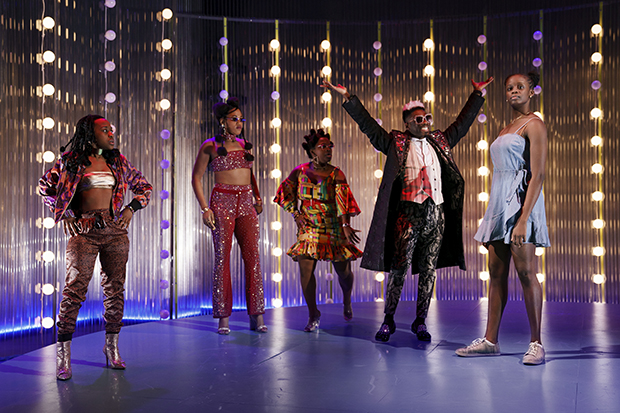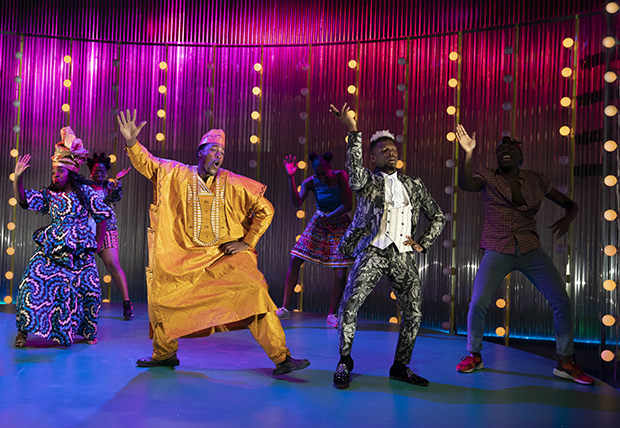Nodding to Beyoncé and Brecht in If Pretty Hurts Ugly Must Be a Muhf*cka
Writer Tori Sampson marks her professional debut with this new comedy at Playwrights Horizons.

(© Joan Marcus)
Beauty is a blessing and a curse. Those who are perceived as beautiful don't always want to be; those who are desperate to be seen as pretty are often deeply envious of others whom they find more attractive. This dilemma is at the heart of Tori Sampson's If Pretty Hurts Ugly Must Be a Muhf*cka, now running at Playwrights Horizons. Directed by Leah C. Gardiner, the play finds four women coming to terms with their looks, while simultaneously riffing on West African folklore and contemporary American culture. The result is a lovable but chaotic piece of theater, one that's simultaneously energizing and vivacious, and also too loose to be fully successful.
Everyone in the fictional village of Affreakah-Amirrorikah is jealous of Akim (Níkẹ Uche Kadri), for she is widely considered to be the beautiful one among her classmates. Her three frenemies are no less so, but they're still jealous, with ages of societal norms having worn them down. Massassi (Antoinette Crowe-Legacy) only sees curves that get in the way of her being a conventionally lithe ballerina. Kaya (Phumzile Sitole) knows that she's the "smart one," but "smart" is never in the same sentence as "pretty." Adama (Mirirai Sithole) finds herself trapped in a body that people assume carries pain and anguish. When the handsome Kasim (Leland Fowler) takes a liking to Akim, Massassi finds herself at wits' end and takes matters into her own hands.
You can imagine what happens from there. Indeed, the story within If Pretty Hurts Ugly Must Be a Muhf*cka is somewhat predictable, but there's nothing obvious about Simpson's storytelling style. Her voice is really cool and imaginative, creating a play that pulsates with contemporary vernacular and old-school theatricality. There are nods to Brecht, Baptist mimes, and the ancient Greeks, alongside live music (by Ian Scot) and dance (lively choreography by Raja Feather Kelly), and even an auditorium-shaking gospel number (excellent singer Carla R. Stewart takes the audience to church with her soaring vocal performance).

(© Joan Marcus)
Of course, with so much going on, there are times when If Pretty Hurts is awfully hard to follow. Gardner's abstract physical production doesn't help in that regard, nor does Louisa Thompson's largely empty set. Matt Frey's dreamlike lighting gives us somewhat of a sense of time and place, while Dede Ayite's vibrant costumes help define all that we have a hard time delineating.
Not all of the written material lands, either. Despite a majorly charismatic performance by Rotimi Agbabiaka, his narrator role needs sharpening or eliminating. The impact of the final scene is reduced somewhat by a baggy set change. And the whole piece could stand to lose around 20 minutes without reducing the impact and all that makes it special. But Sampson is onto something here, and I wish the piece were just a little tighter so it could fully deliver on its ambitious style of storytelling.
Complementing the play's strengths is the really incredible cast. Particularly good is Kadri, who lets innocence guide her way, and Crowe-Legacy, whose blazing emotional arc seems to grow beautifully before our very eyes as she lives her truth. The ultimate message of the play couldn't be more important, and it is intrinsic to both of their heart-filled performances.
Everyone has to go on a journey to discover what their beauty is, and as Beyoncé says in her song that partially inspired the play's title, "You can't fix what you can't see / it's the soul that needs the surgery." Sampson's play lives by that dictum, and though not all of the elements within If Pretty Hurts completely coalesce, it's nice to be reminded every now and then that sometimes you're perfect just the way you are.







